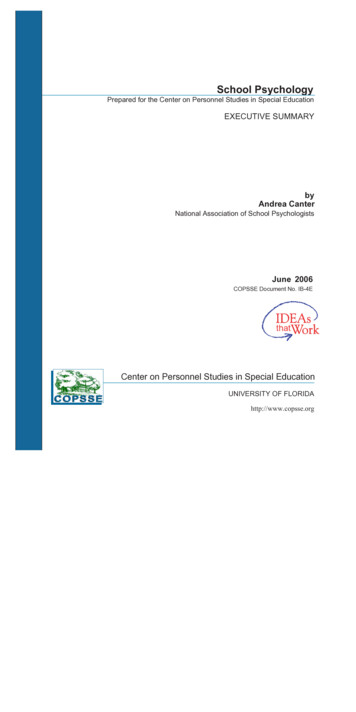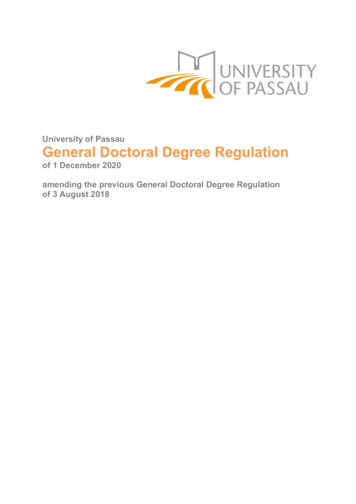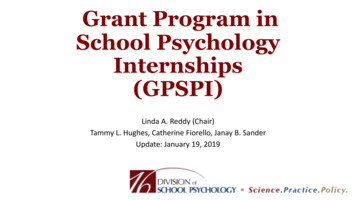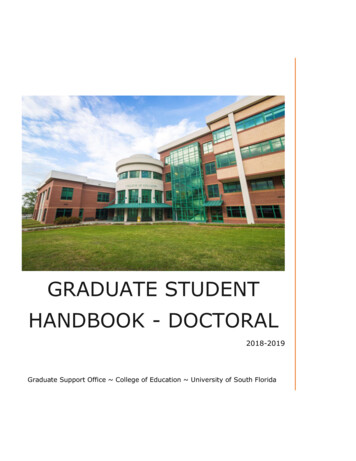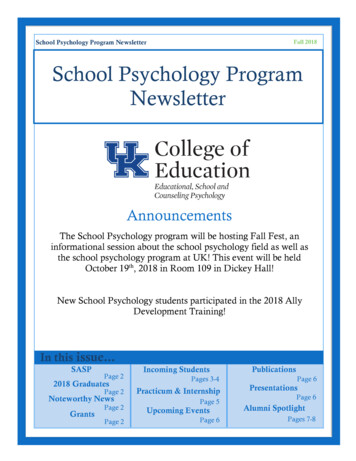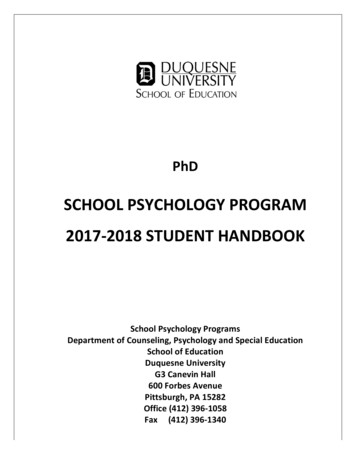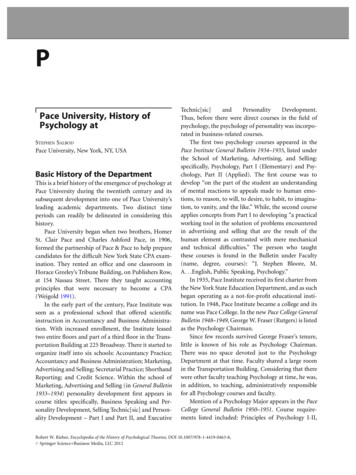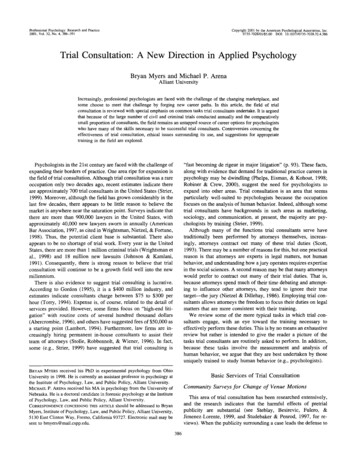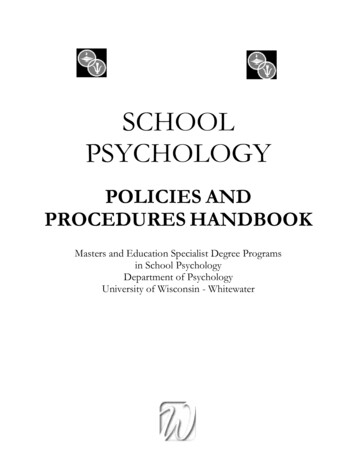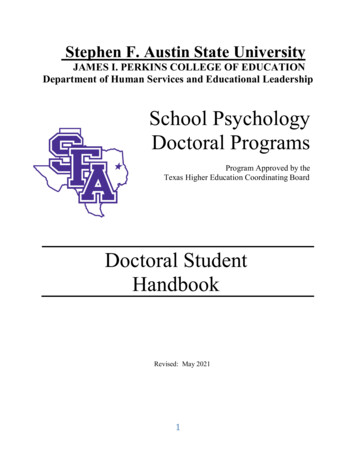
Transcription
Stephen F. Austin State UniversityJAMES I. PERKINS COLLEGE OF EDUCATIONDepartment of Human Services and Educational LeadershipSchool PsychologyDoctoral ProgramsProgram Approved by theTexas Higher Education Coordinating BoardDoctoral StudentHandbookRevised: May 20211
Program ResourcesProgram Faculty & Staff:Luis Aguerrevere, Ph.D., LPAProgram Coordinatoraguerrevle@sfasu.edu(936) 468-1153Nina Ellis-Hervey, Ph.D.,LP, LSSP, NCSPellishernm@sfasu.edu(936) 468-1306Jaime Flowers, Ph.D.,BCBAjaime.flowers@sfasu.edu(936) 468-1219Daniel McCleary, Ph.D.,LP, LSSP, NCSPmcclearydf@sfasu.edu(936) 468-3940Elaine Turner, Ph.D.,LP, LSSPelaine.turner@sfasu.edu(936) 468-1219Kristina Tannery,Program Secretarykristina.tannery@sfasu.edu(936) 468-64012
Program ResourcesProgram Advisory Council:Frankie Clark, Ph.D.,LP, LSSPfcaclark1967@gmail.comJoseph Kartye, Ph.D.,LP, LSSPjkartye@consolidated.netKim Kassaw, Director of Special Services,Lufkin ISDkkassaw@lufkinisd.orgSylvia Middlebrook, Ph.D.,LP, BCBA-Dmiddlebrs@sfasu.edu3
TABLE OF CONTENTSWelcome .6General Information about the Doctoral Program .7The School Psychology Doctoral Program.8Program Overview . 8Philosophy . 9Domains of School Psychology Professional Practice (2020) as Outlined by NASP Error! Bookmarknot defined.School Psychology Program Goals, Objectives, & Competencies . 10State Licensure and Certification at the Doctoral Level . 11Program Emphasis . 11Accreditation . 12Admissions and Degree Requirements .12Student Selection . 12Support for Diversity . 13Student Demographic . 13Minimum Completion Requirements . 13Program Sequence and Curriculum . 14Residency . 16COVID-19 Statement . 16Grade Standards and Quality Points . 16Time Limitations . 17Faculty . 17Degree Plan . 17Transfer Credit . 17Professional Standards . 18Student Support Opportunities and Resources . 18Graduate Assistantship . 184
Lumberjack Education Assistance Program . 19Professional Activities . 19Making Changes .20Due Process . 21Assessment of Dispositions . 22Independent Study . 22Changing the Degree Plan . 22Evaluation and Review of Student Performance .22Process for Evaluation of Student Progress . 22Retention . 22Inactive Status . 22Leave of Absence . 22Probation and Dismissal . 23Practicum and Internship Requirements .23Doctoral Internship Training Eligibility .23Doctoral Internship Training Program Options. 24Petition for Candidacy.26Doctoral Comprehensive Examinations . 26Doctoral Dissertation Requirements and Procedures.26Doctoral Dissertation Committee . 26The Dissertation Process . 275
WelcomeDear Student,On behalf of the faculty, staff, and students of the Department of Human Services and EducationalLeadership at Stephen F. Austin State University, we welcome you to the School Psychology DoctoralProgram. Whether you are coming to us from near or far, you are joining a dynamic community of facultyand students who are engaged in learning, teaching, research, and professional leadership in the field ofschool psychology. With the ongoing advance of research and professional practice, we believe that thespirit of inquiry and the dedication to professionalism that flows from the scientist-practitioner model willbe a career-long gift. We hope you will find the School Psychology Program, the Department of HumanServices and Educational Leadership, the James I. Perkins College of Education, and University to be anexciting, stimulating environment in which to grow professionally and personally.The role of a psychologist is a complex one that requires a variety of technical skills and personalqualities to be successful. Care has been taken to sort out the skills, knowledge, and qualities that shouldprepare you to work effectively with future clients and varied work settings. However, no trainingprogram can singularly develop all that is necessary. Your professional development ultimately dependsupon your own abilities, desires, and initiative to learn and grow. Your experience as part of the Texaspsychology community will be enhanced by becoming a student member of such organizations as theAmerican Psychological Association (APA), the Texas Psychological Association (TPA), the NationalAssociation of School Psychologists (NASP), Texas Association of School Psychologists (TASP), theAssociation for Behavior Analysis International (ABAI), and the Texas Association for BehaviorAnalysis (TxABA). We strongly encourage membership in professional organizations and activeengagement in our program-level student organization, which will prove beneficial in becoming a part ofour local community.The program faculty members have prepared this handbook to serve as a guide while you complete thedoctoral program. We suggest you use it as your first source of reference for any questions you may have;however, please remember that your faculty advisor is the best point of contact you have with theprogram.The SFASU School Psychology Faculty6
General Information about the Doctoral ProgramStephen F. Austin State University (SFA) is a regional university located in Nacogdoches, TX, a thrivinghistoric community nestled in the beautiful piney woods of East Texas, only 132 miles from Houston and165 miles from Dallas. With a student population of approximately 13,000, SFA has a strong reputationfor excellence. Located within the SFA Perkins College of Education (PCOE) Department of HumanServices and Educational Leadership, the School Psychology Program has a long-standing commitment toengagement in cutting edge research, training practices, and the integration of technology.The inception of the School Psychology Doctoral Program was in 2009. The degree takes 3- or 4-yearsyears to achieve leading to a Licensure as a Psychologist in the State of Texas. Graduates of the SchoolPsychology Doctoral Program have a high rate of employability upon graduation and licensure.Typically, students in the program receive multiple job offers following and in the process of graduation.It is common for Texas school districts and special agencies to contact program faculty with openingsthroughout the year for full and part time School Psychologists around the country. Further many of ourgraduates work in independent clinical practices or at higher education institutions. The State of Texas(and places across the country) have continued to identify School Psychologists and Psychologists ashigh-need areas.All students admitted prior to Fall 2018 were admitted as post-MA students and were required tocompleted a masters degree in school psychology prior to admission. Beginning in Fall 2018, the programoffers a post-BA track for the PhD program, meaning PhD students are no longer required to complete amasters degree in school psychology before beginning doctoral studies.Facilities. The Human Services and Telecommunication Building’s (HSTC) network infrastructureaccommodates gigabit Ethernet to the desktop for high-speed networking. It contains InteractiveTelevision classrooms with H.323 protocol and H.320 backward compatibility. There is a digital videoediting facility with the ability to stream media feeds for interactive internet-distributed multimediacontent. All classrooms have ethernet connectivity for student use as well as multimedia presentationcapability, internet access, document cameras and sophisticated built-in computer systems. In addition,the building and campus offers wireless connection capability for students.Many resources also are available in the College of Education, including a TV studio, Macintoshcomputer lab, and an audiovisual materials lab. State-of-the-art technology is available to students andfaculty through the Center for Professional Development and Technology.In addition to the above facilities and resources, the HSTC also contains a School Psychology AssessmentCenter, Human Neuroscience Laboratory, the Counseling Clinic, Stanley Speech and Hearing Clinic, andthe Cole Audiology Laboratory. The Journal of Human Services: Training, Research and Practice,http://scholarworks.sfasu.edu/jhstrp/ is also connected to the School Psychology faculty at the departmentwith national and international representation on the Editorial Board. The journal serves as an accessibleoption for the publication of faculty and students’ scholarship. The departmental website iswww.humanservices.sfasu.edu, which provides an overview of all opportunities available. These settingshave state-of-the-art equipment for training students in applied practice and research. Both the CounselingClinic and Speech and Hearing Clinic have recording capabilities in all the clinic rooms, conferencerooms, and student work areas. The SFA School Psychology Program includes resources for clinical andresearch experiences.7
The School Psychology Doctoral ProgramThe SFA School Psychology post-master’s Doctoral Program was authorized by the Texas HigherEducation Coordinating Board (THECB) in 2009, and the post-baccalaureate PhD track was authorizedby THECB in 2018. Since 2009, the doctoral program has been dedicated to producing ethical,responsible, and competent school psychologists who employ scientific knowledge and methods ofcritical and creative problem-solving. The mission of our program is to apply scientific knowledge andmethod to the assessment and treatment of learning, behavior, and psychosocial problems in general andspecial education populations in public schools. Our program emphasizes critical thinking,communication, personal responsibility, social responsibility, empirical and quantitative skills, andteamwork. A cohort training model is used based on an established course sequence, and the instructionalmodality is face-to-face in a physical classroom. Students in the School Psychology Program will beprepared to become licensed doctoral-level health service psychologists, who can work effectively withchildren and families. In addition, our students may be employed as educators, researchers, and/orpractitioners in public schools and higher education as well as health service psychologists in communitymental health facilities, hospital/medical settings, and independent practice.Program OverviewThe School Psychology Doctoral Program at SFA embraces a scientist-practitioner model of training inwhich practice, research, and theory are considered integrated components. The emphasis is ondeveloping competencies necessary for functioning in diverse settings including public, private schools,and clinical practices. The program is dedicated to training graduates who are competent in each area:Scientist: The scientist is expected to understand and advance basic knowledge in school and healthservice psychology. Students are educated to be skilled consumers of research as well as researcherscapable of examining relevant problems, both empirical and applied.Practitioner: The practitioner is expected to demonstrate a high level of expertise in the professionalpractice of psychology in the state of Texas. This expertise includes the areas of consultation, assessment,and intervention.There are two options to complete a Ph.D. program in School Psychology at SFA. Both the 66-hour postmaster’s Ph.D. program and the 99-hour post-bachelor’s Ph.D. program in School Psychology aregrounded in the scientist-practitioner training model. The programs view the role of scientist-practitioneras one who is: (1) a consumer of empirically based practices, (2) a reflective decision maker regardingprofessional actions and, (3) a researcher who collects data from their own settings and reports thesefindings to the professional community. The programs adhere to the idea that practice and research shouldreciprocally influence and strengthen each other. The programs prepare students to integrate scientificknowledge and skills into all professional activities, to promote empirically established practices onbehalf of those being served, and to exemplify the legal and ethical standards of the psychologyprofession.The SFA Psychology Programs stress the applied scientific nature of the field of psychology and itsprofessional and ethical responsibilities to those that it serves while respecting the cultural diversity withall those with whom its faculty and students work. Training orientation is the the biopsychosocial modelas the central unifying scientific themes in understanding human behavior in working with childrenfamilies and schools. Within the training orientation, emphasis is placed on effective scientificallysupported interventions for learning, behavioral, emotional and family and system problems.8
PhilosophyThe primary purpose of the program is to prepare students to provide and promote scientifically researchsupported, psychological services for children, youth, and families. The program is founded on the centralbelief that school psychologists offer a unique and valuable contribution to society through the provisionof scientifically sound prevention and intervention services. The need for quality school psychologicalservices has been strongly felt throughout the East Texas community, the state of Texas, and the UnitedStates.As a program within the Department of Human Services and Educational Leadership in the PCOE, theprogram emphasizes the professional identity of school psychologists within the broader field ofpsychology that prepares students to competently perform a variety of school psychology functions. Theprogram also addresses an education that values and respects cultural diversity among students, faculty,and service recipients.The program’s philosophy is operationalized through the following specific values:1. Approaches every aspect of professional functioning from a science-based practice perspective;2. Adopts a systems-based ecological framework that acknowledges the multiple influences onhuman behavior including biological, environmental, cultural, familial, socio-political, andinstitutional influences;3. Works respectfully, collaboratively, and ethically with parents, teachers, and other keyindividuals in the lives of children and youth;4. Treats every person as a unique individual who is capable of improving their life in dignified andmeaningful ways;5. Honors and accommodates human diversity while acknowledging basic aspects of humanfunctioning that are common to people of all ages and backgrounds;6. Advocates and upholds the legal and ethical standards of the psychology profession;7. Honors the role as citizens of the school psychology profession by giving back to the professionthrough leadership and other service-related activities in professional organizations, research anddissemination activities, and other forms of service to the profession;8. Serves a pragmatic societal function in the state of Texas and beyond through the provision ofquality prevention and intervention services to children, youth, parents, and families; and9. Maintains a steadfast commitment to professional improvement and accountability through theongoing evaluation of all professional activities.Although not accredited, the program integrates the following philosophical and ethical foundations of theAmerican Psychological Association in all training activities: Psychologists are committed to increasing scientific knowledge of behavior and people’sunderstanding of themselves and others and to the use of such knowledge to improve thecondition of individuals, organizations, and society. Psychologists respect and protect civil and human rights and the central importance of freedom ofinquiry and expression in research, teaching, and publication. They strive to help the public in developing informed judgments and choices concerning humanbehavior. In doing so, they perform many roles such as researcher, educator, diagnostician,therapist, supervisor, consultant, administrator, social interventionist, and expert witness. (Fromthe preamble of the Ethical Principles of Psychologists and Code of Conduct, APA, e program honors the following tenets of the National Association of School Psychologists:The National Association of School Psychologists (NASP) empowers school psychologists by advancingeffective practices to improve students’ learning, behavior, and mental health. (From the mission9
statement of the National Association of School Psychologists, hool Psychology Program Goals, Objectives, & CompetenciesThe program mission is to apply behavioral scientific knowledge and methods to the assessment andtreatment of learning, behavior, and psychosocial problems in children adolescente, adults and theirfamilies. Our program emphasizes functional analytic, collaborative, and data-based decision makingexpressed in the following themes:1. An appreciation and respect for the special attributes, dignity, diversity, and uniquecharacteristics of each student as a contributor to our culture;2. A commitment to support the best interests of students over and above bureaucratic andprocedural demands of institutions;3. An emphasis on the scientist-practitioner model of problem solving directed at behavioralassessment, intervention, follow-up treatment, consultation, applied and basic research, and ongoing program evaluation.4. Our training model assumes that the primary functions of a school psychologist are relevant toboth learning and social issues as well as mental health issues outside the academic realm. Anadditional tenet of this training model is that the school psychologist’s service is most effectivewhen it is approached from a data-based decision-making orientation.These goals and the manner in which they are operationalized are consistent with the SFA mission, whichstates that the University is a comprehensive institution dedicated to excellence in teaching, research,scholarship, creative work, and service. These goals also reflect the mission of the PCOE, which is toprepare competent, successful, caring and enthusiastic professionals dedicated to responsible service,leadership, and continued professional and intellectual development.Through the personal attention of our faculty and staff, we engage our students in a learner-centeredenvironment and offer opportunities to prepare for the challenges of living in the global community.Graduates will be qualified to contribute substantially to the following needs and service trends:1. provision of scientific research-based intervention services to children for academic, behavioraland emotional problems within the schools, where they can be delivered most immediately andeffectively;2. provision of prevention services through assessment screenings, systems analysis, and dataanalysis;3. creation and provision of culturally responsive interventions and helping services to children ofall backgrounds;4. provision of services for children, adolescents and adults with significant behavioral, cognitive,physical, and psychological challenges;5. implementation of applied research and dissemination pertaining to wellness and remedialprograms for children and youth;6. establishment of effective data collection and analysis systems for school and programimprovement;7. assessment of instructional, behavioral and emotional problems;8. consultation services with schools, teachers, and parents, provision of assessment andinterventions for children, adolescents, and families in environments that include but are notlimited to schools, colleges/universities, community mental health settings, hospitals, andspecialized treatment settings.10
State Licensure and Certification at the Doctoral LevelThe School Psychology PhD program meets the Rules of the Texas Behavioral Health Executive Council(BHEC) and Texas State Board of Examiners of Psychologists (TSBEP). In addition to the degree inSchool Psychology, students must pass a national exam for licensure: the Examination for theProfessional Practice of Psychology (EPPP) for licensure as a psychologist (doctoral level) or as alicensed psychological associate (Master’s level). Both levels of licensure, licensed psychologist andlicensed psychological associate require the passing of a state jurisprudence exam as well. Otherrequirements for the LP licensure include a one-year doctoral internship supervised by licensedpsychologists, and a one-year postdoctoral experience supervised by a licensed psychologist. Provisionallicensure must be acquired prior to full licensure. EPPP and the Jurisprudence examination must bepassed prior to this. TSBEP Rules change frequently. It is the responsibility of the student to remaininformed of these changes. TSBEP has set rigid deadlines and guidelines, and students should requesttheir information packet, and review it carefully in order to be well prepared for the licensure process.The licensure process is an expensive process.Although this is not the main focus of the program, students may be elegible for State Licensure as aLicensed Specialist in School Psychology (LSSP) in the State of Texas if they meet all therequirements of the BHEC and TSBEP. Students interested in obtaining the LSSP in Texas mustconsult with the faculty and training directors to make sure they meet all the necessaryrequirements. Subsequent to the degree in School Psychology from a regionally accredited university,candidates must pass a national exam for licensure: the National School Psychology Examination PraxisSeries, School Psychologist exam. These examinations are administered every other month beginning inJanuary. Texas’ minimum passing score for Licensed Specialists in School Psychology is 147. Licensurerequires the passing of a state jurisprudence exam within 6 months of application. The JurisprudenceExamination is required of all candidates for licensure and covers the Texas Psychologists’ LicensingAct, Board Rules, and applicable Texas laws.Program EmphasisThe emphasis of this curriculum is on prevention and intervention within the context of data-baseddecision making. While preparing students to deal effectively with maladaptive behaviors and difficultiesat the individual and systems level, the program also prepares students to identify and utilize strengthsand resources of individuals and systems.To achieve its goals, the program provides extensive training in the foundations of psychology andprepares its students to practice school psychology at a high-level of professional proficiency. The areascovered in the foundations include:1. biological aspects of behavior2. cognitive and affective aspects of behavior3. social aspects of behavior4. history and systems, mental health and psychopathology5. psychological measurement and statistics6. research methodology7. data analysisThose aspects of the doctoral curriculum that relate to professional practice and which comprise strongcomponents of the program include:11
1.2.3.4.5.6.7.8.traditional and functional assessment and data-based decision makingprevention and interventioncollaboration, consultation, and supervisionindividual and cultural diversityorganizational change and program evaluationlegal, ethical, and professional issues in school psychologyextensive practicum experiencea comprehensive internshipThe faculty members of the School Psychology program are dedicated to working with students in a closementoring relationship in order to prepare them for doctoral-level practice and research. Students areencouraged to pursue outside experiences and professional interactions (e.g., professional organizationmembership, present at regional and national conferences, and publish in refereed professional journals).In particular, faculty in the school psychology program are dedicated to working with students fromdiverse and multicultural backgrounds and are particularly interested in promoting the achievements ofstudents from under-represented populations. As per the THECB’s authorization of this doctoral program,didactic instruction is provided face-to-face in a classroom or other appropriate setting. Online classes arenot provided within either of the doctoral course sequences.AccreditationStephen F. Austin State University is accredited by the Southern Association of Colleges and Schools(SACS) and the Texas Higher Education Coordinating Board as a Bachelor's, Master’s, Specialist, andDoctoral degree granting institution. The Council for the Accreditation of Educator Preparation (CAEP)accredits teacher education programs at the bachelor's, master's, and specialist's degree levels. The SFAGraduate School adheres to the Guidelines of the Council of Graduate Schools in the United States, andthe SFA School Psychology Program adheres to the Council’s charge to protect the rights of students.Admissions and Degree RequirementsStudent SelectionThere are three different paths for student selection in admission to the doctoral program. Applicants withMA degrees in school psychology or a related-field, who receive positive ratings of required applicationmaterials (i.e., comp
The School Psychology Doctoral Program The SFA School Psychology post-master's Doctoral Program was authorized by the Texas Higher Education Coordinating Board (THECB) in 2009, and the post-baccalaureate PhD track was authorized by THECB in 2018. Since 2009, the doctoral program has been dedicated to producing ethical,
